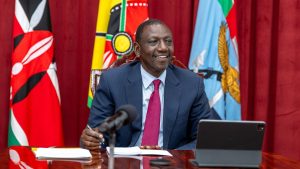KURA Boss Silas Kinoti Faces Legal Storm Over Funding Gen Z Protest

The Director-General and CEO of the Kenya Urban Roads Authority (KURA), Eng. Silas Kinoti, is at the center of a major legal battle following the filing of a petition in the High Court of Kenya. The petition, submitted by citizens Salim Mvuria and Zipporah Juma, accuses Kinoti of financing and coordinating politically driven protests that rocked Nairobi and several other towns throughout June 2025. The demonstrations, according to the petitioners, devolved into violent riots, resulting in destruction of property, disruption of services, and economic instability.
In addition to the protest-related allegations, the petition exposes what it describes as a deeply entrenched and institutionalized corruption syndicate within KURA under Kinoti’s leadership. The petitioners claim that Kinoti, a senior public official tasked with overseeing vital infrastructure projects, has misused his office to fund political chaos in support of former Deputy President Rigathi Gachagua. They allege that the protests were not spontaneous, but instead highly organized operations characterized by the storming of public buildings, looting of businesses, and assaults on police officers and civilians, including journalists and children.
According to the petition, these events were supported through clandestine financing linked to Kinoti’s office. Intelligence sources and investigative leads are cited, indicating that logistics and payment for the demonstrators—often referred to as “goons”—were handled through contractors and shell companies affiliated with KURA. The petition claims that Kinoti exploited his position to facilitate financial misappropriation in a bid to advance a political agenda rooted in destabilization.
The corruption allegations outlined in the petition paint a damning picture. Kinoti is accused of leading a network within KURA that awards inflated road tenders to cronies and ghost firms in exchange for kickbacks. Regional directors are allegedly coerced into remitting illicit payments for protection or favorable assignments. The petition further claims that Kinoti has unlawfully retained retired employees in strategic positions as part of a patronage system, enabling continued manipulation of the agency’s finances. Whistleblowers, the petition says, have been threatened, transferred, or victimized to prevent exposure of the misconduct, fostering a culture of impunity and mismanagement.
The petition argues that Kinoti’s actions constitute numerous violations of the Constitution of Kenya and multiple Acts of Parliament. These include the abuse of state authority, breach of public trust, misuse of public funds, violation of citizens’ right to life and property, and distortion of public service values. The petitioners cite specific constitutional articles that they claim Kinoti has violated, ranging from leadership and integrity provisions to protections against economic sabotage and incitement.
Beyond constitutional violations, Kinoti is also accused of contravening several key laws, including the Public Officer Ethics Act, the Public Finance Management Act, the National Cohesion and Integration Act, the Public Order Act, and the Penal Code. The cumulative effect, according to the petitioners, is a pattern of conduct unfit for any holder of public office.
Mvuria and Juma are seeking sweeping judicial orders. They want the High Court to declare that Kinoti has violated the Constitution and committed gross misconduct. They are asking for a permanent injunction barring him from holding any public office and for various agencies to initiate comprehensive investigations into his actions. Among these are the Ethics and Anti-Corruption Commission (EACC), the Directorate of Criminal Investigations (DCI), and the National Cohesion and Integration Commission (NCIC), with each body tasked to probe different aspects of the alleged wrongdoing—from financial mismanagement to ethnic incitement.
The petition also calls on the Auditor-General to conduct a special audit of KURA’s financial dealings during Kinoti’s tenure, and for the Public Service Commission and the Cabinet Secretary for Roads and Transport to investigate the illegal retention of retired personnel. Furthermore, the petition urges the Attorney General to initiate civil recovery proceedings to reclaim any funds lost through the alleged graft network.
As the case proceeds to court, its outcome is expected to have wide-ranging implications for Kenya’s public sector accountability and anti-corruption efforts. With a senior official from a key government agency now facing such serious charges, the petition signals growing public demand for transparency and justice in governance.






